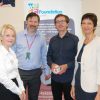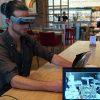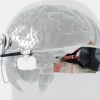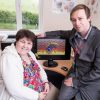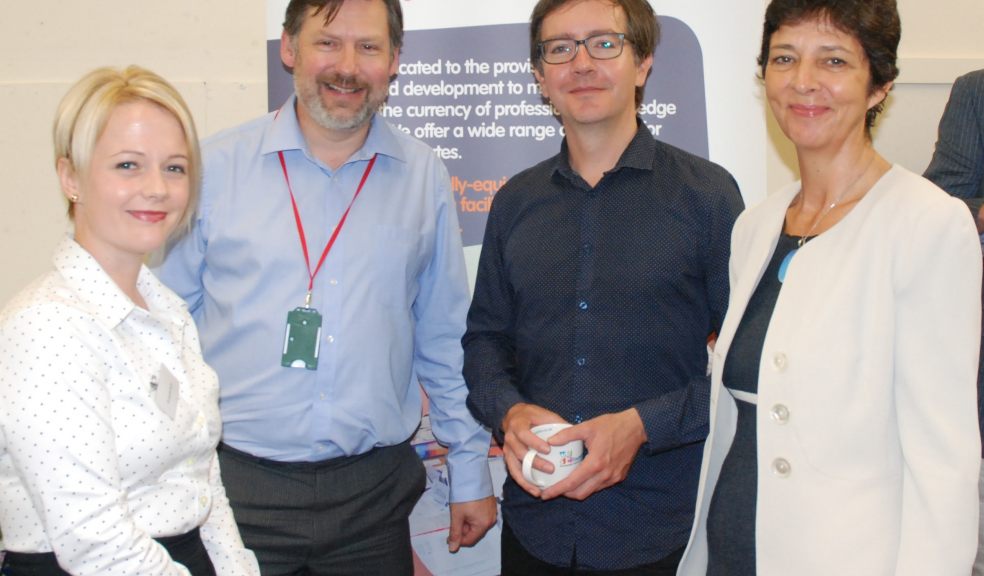
Advances in visual impairment technology revealed in Exeter
On 2 July 2015, Visual Impairment (VI) was put under the spotlight at a special conference hosted by the WESC Foundation in Devon, where experts from around the world came together to reveal their latest research findings and technological advancements to Special Educational Needs (SEN) and healthcare professionals, carers, local authority representatives, and specialist schools and colleges.
The day covered all the latest developments in medical technology, such as stem cell therapy, optogenetics, gene therapy and vision prosthesis (bionic eyes) to help combat retinal eye disease, as well as revealing the ground-breaking design of Smart-Glasses aimed at helping visually impaired people to navigate every-day obstacles.
There was much anticipation to hear from keynote speaker at this year’s Conference, Dr Lauren Ayton – a member of Bionic Vision Australia – who had flown in from the University of Melbourne to speak on vision restoration, and in particular her work coordinating Bionic Eye Clinical Research to restore vision to people with retinitis pigmentosa and age-related macular degeneration.
Dr Ayton led her audience on a brief history through the advances in medical technology, including the very early attempts at improving vision, before taking a more in-depth look at all the current vision restoration treatments such as stem cells, gene therapy and bionic eyes – set to become more common in the future.
Dr Ayton highlighted the positive developments being gained in both optogenetics – she revealed a video showing mice whose ability to navigate to light greatly improved following light therapy – and stem cell therapy – where great advancements are being made into improving vision and even recreating an eyeball – although no progress has yet been made on how to connect the eye to the brain, possibly the most complex problem of all.
Dr Ayton also revealed results of the recent Bionic Vision Australia Clinical trial of a retinal prosthesis, which can combat hereditary retinal eye disease and age-related macular degeneration. Following a successful initial trial, Dr Ayton is looking to extend the bionic eye project beyond the laboratory to enable participants to take the bionic eye home with them for periods of time. Dr Ayton is also part of a worldwide organisation to pool research into visual impairment to make sure people get the best possible outcome.
Worthy of one of the special gadgets from a Mission Impossible or James Bond movie, Dr Stephen Hicks showcased the latest prototype of his assisted vision and Smart-Glasses research project. Research Fellow in Neuroscience and Visual Prosthetics at Oxford University, Dr Hicks says: “The idea of the Smart-Glasses is to give people with poor vision an aid that boosts their awareness of what's around them – allowing greater freedom, independence and confidence to get about, and a much-improved quality of life. We eventually want to have a product that will look like a regular pair of glasses and cost no more than a few hundred pounds – about the same as a smart phone”.
Thanks to funding via the Google Impact Challenge, Dr Hicks has been able to develop a more portable version and is working on further refinements to work towards a sleeker look. The Smart-Glasses project is set to be rolled out to 300 participants across the UK this month (July) to test out how the glasses can improve a person’s ability to navigate obstacles and also to improve their vision.
Returning to the Conference for a second year, Dr Fiona Rowe, a Reader in Health Services Research at the University of Liverpool, discussed her research with Stroke patients, which reveals a lack of support for stroke survivors with visual impairment. Her findings highlight the need for health care services to be fully integrated and aware of visual problems after stroke, and provide patients with the best possible support.
Dr Rowe says: “There’s a lot of misinformation out there. It’s poppycock that nothing can be done and we’re trying to change that message to get everyone referred through. There is a lot that can be done but, at the moment, many people are left dangling.”
Over the last two years, WESC Foundation’s own research department, headed up by Research Scientist Dr Jonathan Waddington, has been designing and developing an engaging computer game aimed at assessing and if possible improving the functional vision of young people with cortical visual impairment. At this year’s annual conference, Dr Waddington updated his audience on the development of the game, and a pilot study during which visually impaired players were given the game to play at home for three weeks.
Dr Waddington says: “We are now at a point where we need to reflect on what we have learned and see where to go from here. We are looking at what direction we want to take the project and what funding we need to do so.”
Tracy de Bernhardt Dunkin, Principal & Chief Executive at WESC Foundation says: “Research supports our work and enables us to understand the barriers we need to break down to make learning more accessible for our learners. We work with key universities in pioneering this research.
“Central to our philosophy of education is a commitment to keep our knowledge in line with the latest international research and development to train our staff effectively in new thinking and technologies. Our Annual international conference is paramount to this development and enables us to draw on our eminent research partners across the world and showcase our own developing research portfolio.”
There are an estimated 25,000 blind and partially sighted children in the UK needing specialist educational support (that’s one in every 500 children). Evidence suggests that cerebral visual impairment (visual impairment caused by brain injury) is the most common cause of visual impairment in these children. It is also estimated that the number of people living with sight loss in the UK is set to rise dramatically from 1.865,900 (2011) to 2,269,700 in 2020, making the research increasingly important. This is why WESC Foundation is such an advocate of pushing the boundaries of research and development.
WESC Foundation provides education for nearly 100 blind or visually impaired young people and adults and is at the forefront in the development of visual neuroscience technology. The services provided by the organisation ensure students experience the widest possible range of services in education, care, therapies, and mobility, as well as gaining greater independence.
Next year, the WESC Foundation International Conference (Thursday 5 May, 2016) will focus on the topic of Cortical Visual Impairment (CVI). Already confirmed as keynote speaker is Amanda Lueck, who will be talking about her research into this subject and her book Vision and the Brain, which she wrote with Patron of the CVI Society, Gordon Dutton, who is also hoped to be presenting at the International Conference next year.
Anyone wishing to attend next year’s conference (book before 1 September for a price freeze on this year’s conference) or find out further information about WESC Foundation should contact Katy Gaulton on kgaulton@wescfoundation.co.uk or 01392 454200.









